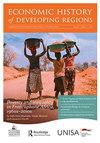Wages of male and female domestic workers in the Cossack Hetmanate: Poltava, 1765 to 1769
IF 0.8
Q1 HISTORY
引用次数: 4
Abstract
ABSTRACT This paper investigates wage inequalities among domestic workers in early modern Poltava (present day Ukraine), which was an important military-administrative of a Cossack Hetmanate, which was an autonomy within the Russian Empire. The data are derived from Rumyantsev census conducted between 1765 and 1769 (N = 1,109). While previous studies often measured domestic workers’ wages indirectly, this historical source contains direct information on their wages in rubles per year. The data suggest that age and social status shaped wages of domestic workers in early modern Ukraine. After the age of 29, wages of all domestic workers stagnated and after 40 wages declined significantly. However, male domestic workers of Cossack origin had higher wages when compared to peasantry, while median wages of married women were similar to that of peasant men, and young girls received higher wages than young boys. These findings open a room for a debate about economic power of male and female workers in early modern Ukraine on the dawn of the Russian Empire centralization.哥萨克帝国中男性和女性家庭佣工的工资:波尔塔瓦,1765至1769年
本文研究了近代早期波尔塔瓦(今乌克兰)家政工人的工资不平等现象,波尔塔瓦是哥萨克帝国的一个重要军事行政区域,是俄罗斯帝国的一个自治地区。数据来源于1765年至1769年间进行的鲁缅采夫人口普查(N = 1109)。虽然以前的研究经常间接衡量家政工人的工资,但这一历史来源包含了以卢布计算的每年工资的直接信息。数据表明,年龄和社会地位影响了近代早期乌克兰家政工人的工资。29岁以后,所有家政工人的工资都停滞不前,40岁以后,工资明显下降。然而,哥萨克裔男性家庭佣工的工资高于农民,而已婚妇女的工资中位数与农民男性相似,年轻女孩的工资高于年轻男孩。这些发现为关于俄罗斯帝国中央集权初期现代乌克兰男性和女性工人的经济实力的辩论打开了一个空间。
本文章由计算机程序翻译,如有差异,请以英文原文为准。
求助全文
约1分钟内获得全文
求助全文

 求助内容:
求助内容: 应助结果提醒方式:
应助结果提醒方式:


